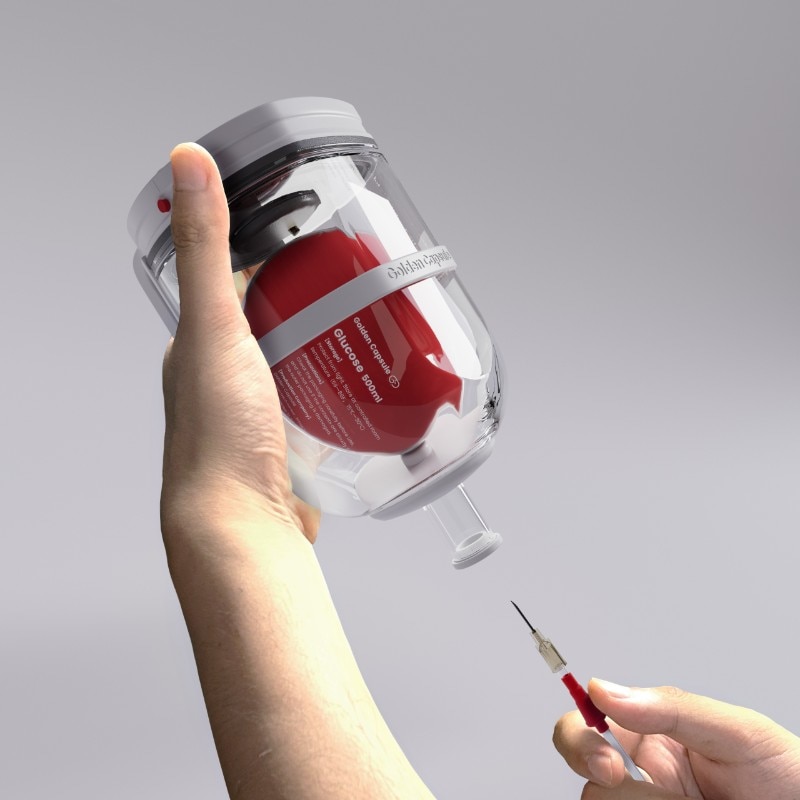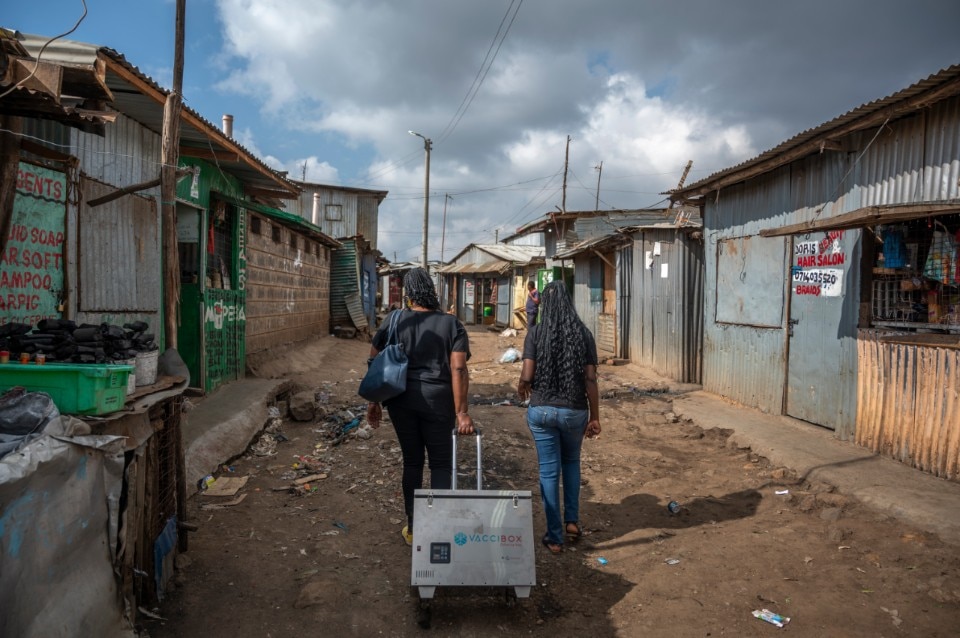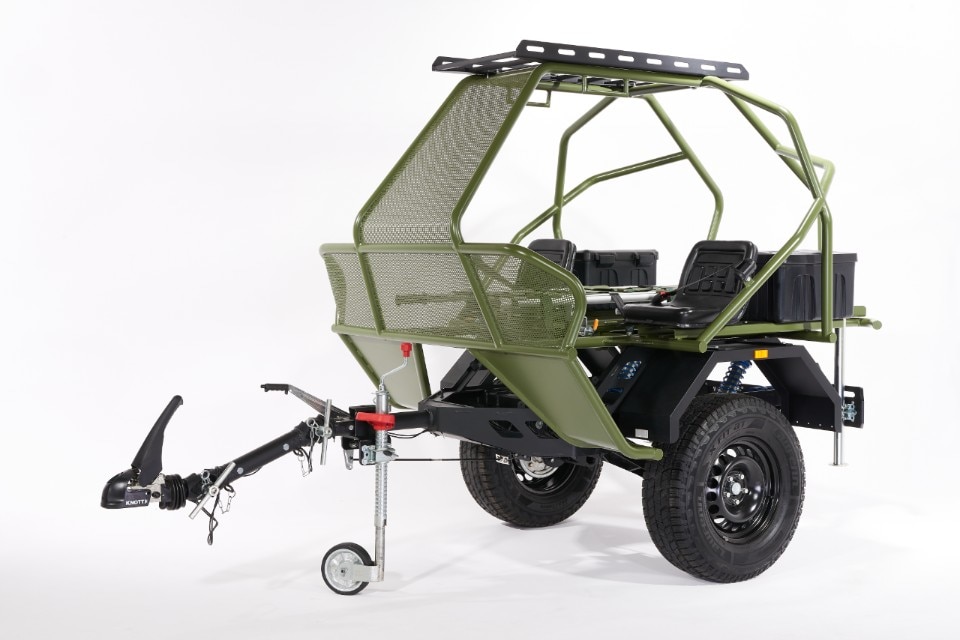This article was originally published on Domus 1093.
Introducing innovations into the health-care sector is never simple, especially when it concerns products used in emergency situations. “Rescue workers and emergency professionals have always been very cautious about anything new,” says Piotr Tłuszcz, the 28-year-old Polish inventor who won the 2023 James Dyson Award with his Life Chariot, an off-road evacuation trailer already in use in Ukraine and designed for any hook-equipped vehicle.
“Tried-and-tested methods are preferable because they’re less risky in such complicated scenarios,” he explains. The predictability of traditional methods and equipment makes them one less thing to worry about. This is one of the reasons engineers and designers consult first-response experts during the concept development of a new product, and subsequently carry out dozens, if not hundreds, of tests under all types of conditions in close collaboration with rescue teams. The Ukraine War forced Tłuszcz to make an exception to this rule. He created his Life Chariot in just five months, basing it on an emergency and storage vehicle prototype he had designed for Poland’s Mountain Volunteer Search and Rescue (GOPR) as part of his university thesis in 2019.

Inspired by dune buggies, the steel trailer features storage compartments on the sides and roof and a stretcher located between two passenger seats. Each element is easily repairable and the tyre pressure has been calibrated to provide good grip on any type of terrain, while the weight of less than 600 kilos ensures excellent manoeuvrability. Thanks to his collaboration with specialised Polish businesses and the support of Da Orffo – the trailer manufacturer Tłuszcz founded with his father in 2012 – the first vehicle quickly rolled off the factory floor and was immediately tested by teams from Poland’s Tatra Volunteer Search and Rescue (TOPR) and the Ukrainian army. The tests led to some alterations, including a lightweight vehicle cover and the development of a modular system for the safe transport of medical equipment.
Of the two Life Chariots produced, one is being used by an army medical unit at the front and the other by volunteer medics from the Polish Damian Duda Foundation. In the future, the engineer aims to acquire new customers in Europe thanks to the vehicle’s versatility and cost (18,000 euros), which make it an excellent alternative to helicopters in hard-to-reach areas. “A lot more real-world testing will be needed to convince industry professionals of its reliability,” says Tłuszcz.
Introducing innovations into the health-care sector is never simple, especially when it concerns products used in emergency situations
In this respect, the James Dyson Award serves as a good endorsement at an international level. In addition to prize money, the award also provides opportunities for networking. “We met the South Korean team that won the International Prize with their Golden Capsule and we’re looking into the possibility of teaming up to offer it to rescue workers with our trailer,” says Tłuszcz. The Golden Capsule is an innovative device that uses elastic force and air pressure to inject drugs into patients during emergencies. Today’s most common method requires rescue workers to raise drip bags and manually squeeze them to ensure a steady flow of medicine.
But neither electricity nor gravity are needed to use the Golden Capsule. Yujin Chae, a 24-year-old student majoring in industrial design and design engineering at Hongik University, started working on it alongside Bai Yuan, Minseok Ko and Kim Daeyeon after seeing images of the Syrian-Turkish earthquake on 6 February 2023. The team wanted to enable paramedics to operate more efficiently in disaster areas and literally free up their hands. The device consists of a low-pressure transparent shell that encases a medicine-filled balloon. By opening an adjustable valve, the pressure inside the shell increases and causes the balloon to be compressed. The medicine can then flow for over 30 minutes regardless of where the shell has been positioned. The team is seeking to optimise the Golden Capsule by reducing its size and analysing how it might perform in extreme conditions with stronger or weaker external pressure.

They are also tackling another practical issue: “The medicine should undergo a sterilisation process within the shell, which would require specialised machinery and labour,” explains Yujin Chae. “However, we’re just students and don’t have the means to finance it. We hope to be able to sell the project’s intellectual property rights to an investor who can put it into mass production.” Indeed, it’s not easy to independently produce state-of-the-art medical devices on a large scale. One person who is well aware of this is Norah Magero, a Kenyan mechanical engineer specialised in off-the-grid cooling systems and the winner of the 2022 Africa Prize from the Royal Academy of Engineering. “In countries like Kenya, we prefer to buy technology from abroad rather than develop it locally,” says the 35-year-old.
Magero is the first Kenyan and second woman to be awarded by the British charitable organisation which, at the end of the pandemic, praised the considerable impact of her VacciBox: a small solar-powered refrigerator for safely preserving and transporting temperature-sensitive medicines. It can even be mounted on motorcycles or small boats to ensure cold-chain supply in rural areas and off-the-grid hospitals. Magero had already conceived an off-the-grid fridge for small-scale Kenyan farmers through her Drop Access NGO, and as a mother she has seen how complicated it is to vaccinate children in rural areas. She developed the project by founding a company in Nairobi (Drop Access Limited) with a group of colleagues, consultants and suppliers.
A lot more real-world testing will be needed to convince industry professionals of its reliability
Today, the company has 13 employees and has already produced and distributed 60 VacciBoxes for public institutions, NGOs and private health institutions for 2,000 dollars each. “It’s really difficult to miniaturise cooling systems, especially when you need to make them suitable for every kind of climate condition within a country,” she explains. “But the Africa Prize has allowed us to receive lots of expert feedback and advice that has helped us improve.” The fourth version will be on the market by the end of the year. As with its previous iterations, it will be equipped with a GPS and software to keep an inventory of everything that enters and leaves the mini-fridge (medicines, organs, tissues and medical equipment).
To make it lighter and easier to transport, VacciBox4 will be made of plastic rather than steel and will be even more compact than the current 40-litre version. The hope is to receive World Health Organization certification, which would allow them to be sold abroad, in particular in Kenya, Tanzania and the Ivory Coast, where the company would be able to ensure maintenance.
Opening image: Piotr Tłuszcz, Life Chariot. Some uses of the Life Chariot in the field. Opposite page. Top: the trailer consists of Da Orffo’s off-road suspension designed for high speeds thanks to gas-adjustable coilover dampers and longitudinal rocker arms. Courtesy Piotr Tłuszcz

FADE Family is the new approach to outdoor living
The latest addition to the PLUST Collection is a line of furniture inspired by the texture of white stone, which illuminates as evening falls.










